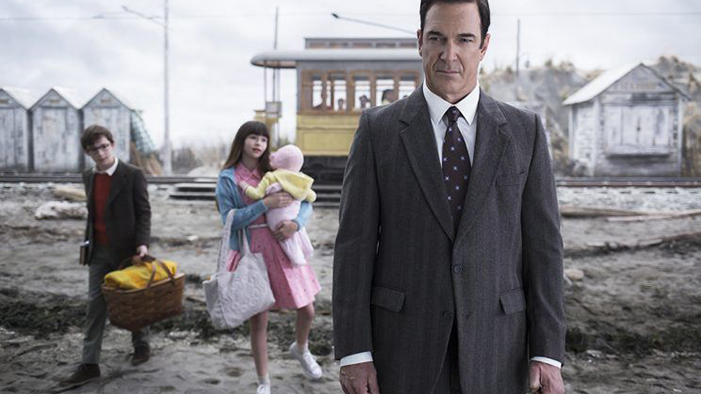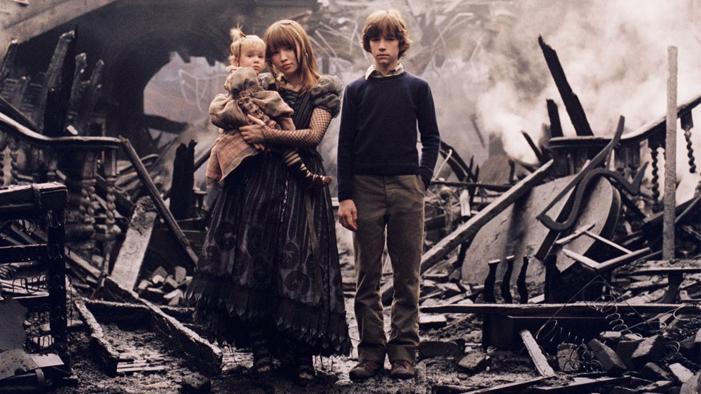5 Changes Netflix Made to A Series of Unfortunate Events (and Why I’m Okay with Each of Them)

Yesterday I stubbed my toe, lost my wallet, and had my car towed, and I still had a better day than you because I also watched every single episode of A Series of Unfortunate Events on Netflix. Guys, I would not lie to you about this—it really is that good.
I’ve made no secret of the fact that I love the books in all their original glory. I have, in the past, criticized the 2004 film, have scorched the venerable name of Jim Carrey with my scathing assessment of his dinosaur screech. (I’m sure he felt it, wherever he is, and I’m sure he cried about it to all his money.) I had high hopes for the upcoming Netflix adaptation and prayed it would stay true to the books I loved; not to be dramatic, but I may have exuded an attitude best described as “IF ANYTHING IS DIFFERENT, I WILL THROW MY WHOLE SELF INTO THE SEA.”
Now, not only did the Netflix show meet my wildly unrealistic expectations, but it exceeded them—and it did so by occasionally deviating from the source material, which I didn’t even think was possible. So let’s talk about how it did that.
There will be light spoilers ahead, but they are more like “Harry is a wizard!” spoilers as opposed to “Snape killed Dumbledore!” spoilers. In short: the items on this list reveal little more than the overall premise, except for the last one, which is straight-up Spoiler City. But I’ll give you plenty of warning before we get to that. So:
The change: Lemony Snicket has a much larger presence. In the books, Lemony Snicket is not only the author of the book, he is also the story’s narrator, one who has dedicated his life to chronicling the misfortunes of the Baudelaire orphans. As the story progresses, we learn that he’s not just a casual bystander—he’s part of the plot. The 2004 movie chose to tackle this by having a faceless Jude Law (a crime on its own) narrate the story from behind a writing desk. In the Netflix adaptation, Snicket delivers his deadpan witticisms and uniquely unconventional style of storytelling right to the camera.
Why I’m okay with it: Lemony Snicket is just as much of a character as the people in the story he’s telling. Putting him right there on Briny Beach or having him climb through underground tunnels while the Baudelaires survey their family’s ruined mansion above—it humanizes him. It makes him real. It allows the audience to connect with the Baudelaires’ tale of woe in a way we wouldn’t have been able to otherwise.
The change: Their adults are more likable. For example, book!Aunt Josephine is frightened and spineless to the end, and always was. In the show, she was a “fierce and formidable woman” before the toils of working in the netherworld of V.F.D. left her bereft of a husband and terrified of doorknobs. I even have a soft spot for Count Olaf’s theatrical henchmen.
Why I’m okay with it: In the books, the adults are consistently ridiculous and often useless. But in such a miserable tale, it’s sometimes helpful to know that there are people on the Baudelaire children’s side. And speaking of which…
The change: V.F.D. is introduced much earlier. The books don’t allow the secret organization known as V.F.D. to begin taking shape until much later in the story. The show, however, makes V.F.D.’s existence apparent almost immediately.
Why I’m okay with it: Most of us were kids when we first read these books. It makes sense that the showrunners would flesh out the drama and intrigue of V.F.D., a shadowy organization spearheaded primarily by adults, to appeal to the now-older fans of the original series. The V.F.D. plot line also serves to provide a cohesive framework for the show, as well as a pervading sense that something bigger exists, something beyond the hardship and heartache of the Baudelaire orphans.
Furthermore, it allows for plenty of Easter Eggs. For instance, when a henchman describes his cake as “lemony,” Count Olaf snarls, “I told you never to say that word!” While drinking his coffee, Count Olaf mentions he’s unable to find the sugar bowl (!!!). The characters at one point say they’re headed to a “vigorously fixed destination,” and at the very beginning, Lemony Snicket says of the fire that destroyed the Baudelaire mansion:
“But all my associates and I have managed to learn is that neither the official fire department nor the volunteer fire department arrived in time to stop the blaze.”
The change: Mr. Poe’s secretary, Jacqueline, is a member of V.F.D. In the books, there was no Jacqueline. Netflix, however, has introduced her as one of the plot’s main driving forces.
Why I’m okay with it: This is purely speculative, but I think in the fullness of time we’ll discover that Jacqueline is not a new character at all. I think she’s actually Kit Snicket, sister to Lemony, and that she’s using a pseudonym reminiscent of her twin brother, Jacques. Either that or the showrunners have decided to merge the characters of Kit and Jacques into one. Kit Snicket is involved throughout the events of the novels, but only appears toward the end. We learn that she was at one point romantically involved with Count Olaf, which makes sense with what we know so far about Jacqueline. In The Reptile Room: Part 2, Kit and Count Olaf definitely seem to have a history.
Okay. The time has come. I’m entering into definite spoiler territory, so this your chance to exit the ride safely. To give you more time, here’s one of my favorite quotes from episode 1:
COUNT OLAF: Well, I hope I can prove myself to be the father you never had.
KLAUS: We had a father.
COUNT OLAF: Yes, I know. And a mother. Remarkable woman. Flammable.
Okay. Are they gone? Is it just us? Let’s do this.
The change: The Quagmire parents are still alive. Throughout the first eight episodes, we’re led to believe that two characters known only in the credits as “Mother” and “Father” are the Baudelaire parents, alive and well, kidnapped but fighting to return to their children. In truth, they are the parents of the Quagmire triplets. In the novels, they perished in a terrible fire.
Why I’m okay with it: If anyone’s parents had to come back to life, I’d prefer it to be the Quagmires’. Bringing back Mr. and Mrs. Baudelaire would’ve been far too jarring a change for me personally. I suppose this could still happen (we have eight books’ worth of material to go, after all), but I highly doubt it will. Giving us, the audience, the barest of hopes for a happy ending for the Baudelaire orphans and then snatching it away is just classic A Series of Unfortunate Events.
Basically: go watch it. It’s wonderfully ridiculous. It really feels like the books, with its rapid-fire dialogue and editorial asides and gothic absurdism. Also, the cinematography is impeccable. It is reminiscent of both The Addams Family and Pushing Daisies, as it should be, because this show was directed by Barry Sonnenfeld, the mastermind behind both. (He also directed Nine Lives, that movie where Kevin Spacey is a businessman trapped in the body of a cat. I have not seen this, but if you have, please don’t spoil it for me. I want this to be the last thing I see before I die.)
I’ll leave you only with this: the world is quiet here.














